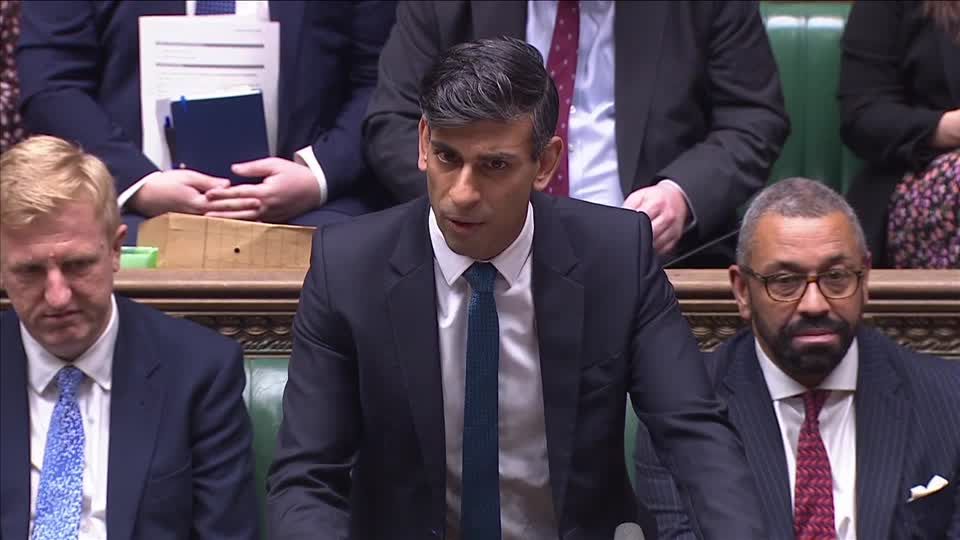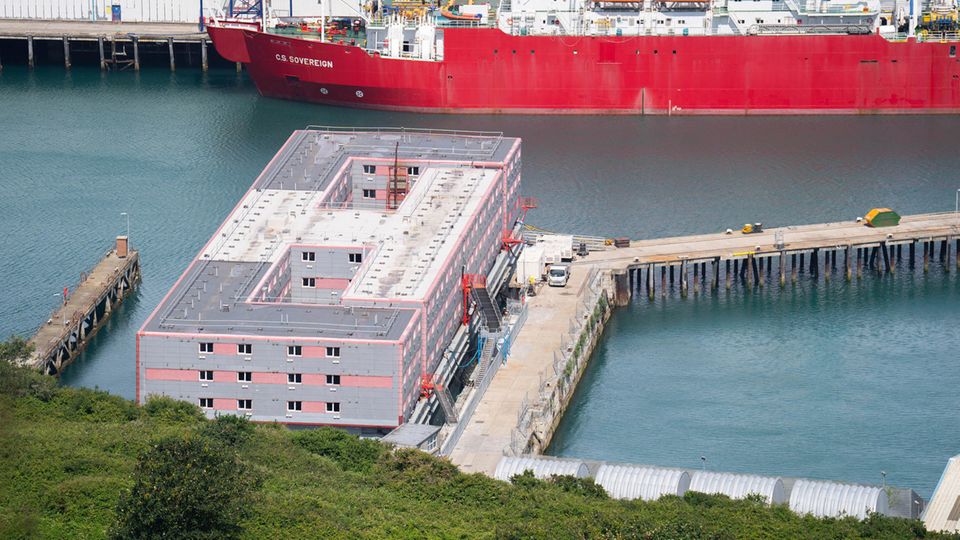The island isolates itself
London is tightening immigration laws – it’s a big project
English Channel: A dinghy with around 50 migrants drifts in English waters as a British border control ship approaches (archive image)
© Dan Kitwood/Getty Images
Around 745,000 people immigrated to Great Britain last year – much more than before Brexit, with which the country wanted to better control migration. Prime Minister Sunak is under considerable pressure. One project in particular is likely to cause discussion.
With significantly stricter hurdles for foreign skilled workers and a new asylum pact for deportations to Rwanda Seal Britain off from migrants. Home Secretary James Cleverly signed a deal in the East African country on Tuesday with which the Conservative government wants to circumvent a ruling by Britain’s highest court.
For the Tories, migration has become more important a few months before the next election. According to surveys, the issue is now a priority for many conservative voters. The right wing of the party is therefore loudly pressuring Prime Minister Rishi Sunak to significantly reduce net immigration, which recently stood at 745,000 people. Brexit was actually supposed to stop migration and create better and better-paid jobs for Brits – at least that was a core promise of the Conservatives.
The agreement stipulates that asylum seekers who enter the UK irregularly will be sent to Rwanda on a “one-way ticket”, regardless of their origin. Returning to the United Kingdom is not possible. The Supreme Court recently rejected this as illegal, citing, among other things, constitutional deficits in the East African country.
Great Britain: Controversial Rwanda Agreement
The new agreement is now intended to provide assurances from the authoritarian Rwandan leadership that it will not deport asylum seekers to their homeland – and thus eliminate the concerns of the Supreme Court. If Rwanda wants to expel a migrant, for example because of a crime, British and Rwandan judges should decide together whether the person should stay in Africa or be brought back to Great Britain. Next, the British Parliament should declare Rwanda a safe third country. Observers are concerned that Sunak could leave the European Convention on Human Rights under pressure from the right in order to avoid legal resistance from Strasbourg.
Cleverly is the third interior minister to try the Rwanda plan in a year and a half. “Home Secretary 3 – Migrants 0,” commented BBC reporter Chris Mason. The government emphasizes that it wants to fly out the first asylum seekers before the election. The date has not yet been set, but there is speculation about May or October 2024. In surveys, the Tories are far behind the opposition Labor party, which is now expected to form the next government. Sunak wants to turn things around with the anti-migration course. However, the primarily symbolic Rwanda policy is only one building block. Will a plane ever take off? Completely unclear. Even Cleverly didn’t want to commit to a time on Tuesday.
The British people’s private lives are also being restricted
The measures that Cleverly announced in Parliament on Monday are likely to have a much greater impact. In the future, foreign skilled workers will have to receive an annual salary of at least 38,700 pounds (45,150 euros) instead of the previous 26,200 pounds in order to be allowed to come into the country. Nursing staff are exempt, but just like students are no longer allowed to bring their relatives with them. Cleverly proudly announced the largest fall in net migration in recent British history. He expects the bottom line to be around 300,000 fewer immigrants. “Enough is enough,” wrote Prime Minister Sunak in an op-ed for the Sun newspaper. There was also approval from the Tory right wing. Hardliners such as former Interior Minister Suella Braverman immediately called for even stricter measures.

Watch the video: Court rejects British government’s Rwanda asylum plan.
Experts view the plans critically. “The signal is: We don’t want you,” said an EU diplomat. The economy expects the shortage of skilled workers to continue to increase. “Once again, the interests of business are losing out to the internal affairs of the Conservative Party,” said the head of the recruitment association REC, Neil Carberry, to the newspaper “Financial Times”. Private life is also affected: Brits will have to earn more than 38,000 pounds in the future if they want to bring their foreign partners to live with them. That is more than twice as much as before – and more than the average income. Satirist Tom Peck commented in the Times that 73 percent of Brits are now too poor to marry a foreigner.


